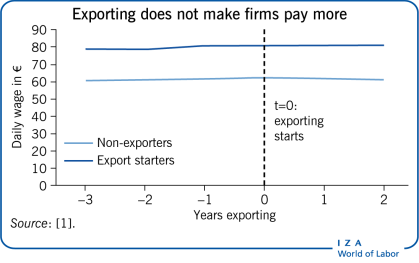Elevator pitch
There is evidence that better performing firms tend to enter international markets. Internationally active firms are larger, more productive, and pay higher wages than other firms in the same industry. Positive performance effects of engaging in international activity are found especially in firms from less advanced economies that interact with partners from more advanced economies. Lowering barriers to the international division of labor should therefore be part of any pro-growth policy.
Key findings
Pros
Better performing firms engage in foreign trade and offshoring activities.
Positive effects of exporting are often found in younger firms that export from less advanced economies to more advanced economies.
Exporters pay higher wages to comparable workers.
International trade and firm survival are positively linked.
The overall negative effects of offshoring on labor markets are modest.
Cons
Low-skilled workers feel pressure from international outsourcing.
The empirical picture is still incomplete due to a lack of strictly comparable international studies.
